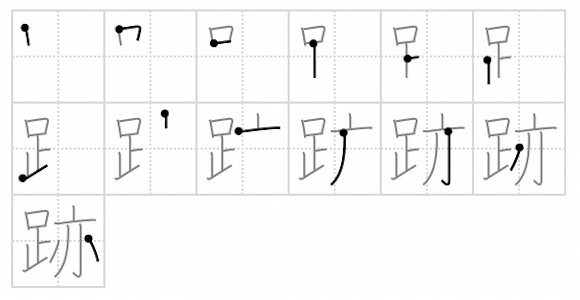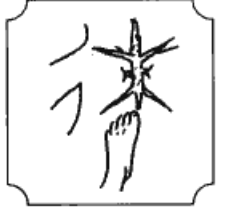Free

- 237 lessons
- 0 quizzes
- 99999 week duration
-
Previous Levels
-
Level 129
-
Level 130
-
Level 131
-
Level 132
-
Level 133
-
Level 134
-
Level 135
-
Level 136
-
Level 137
-
Level 138
-
Level 139
-
Level 140
-
Level 141
-
Level 142
-
Level 143
-
Level 144
-
Level 145
-
Level 146
-
Level 147
-
Level 148
-
Level 149
-
Level 150
-
Level 151
-
Level 152
-
Level 153
-
Level 154
-
Level 155
-
Level 156
-
Level 157
-
Level 158
-
Level 159
-
Level 160
-
Level 161
-
Level 162
-
Level 163
-
Level 164
-
Level 165
-
Level 166
-
Level 167
-
Level 168
-
Level 169
-
Level 170
-
Level 171
-
Level 172
-
Level 173
-
Level 174
-
Level 175
N2 Kanji 205: 跡
Meaning:

In Japanese,跡 means “trace”.
How to read it:

Kunyomi:あと
Onyomi:せき
How to write it:

Origin:

You can see a foot here.
You left the trace by your feet.
So 跡 means “trace”.
| Note: There is some difference between Chinese kanji and Japanese kanji, you should use Japanese kanji,which has a 足 on the left. |

Development:

Vocabulary:
| Level | Word | Reading | Meaning | Type |
|---|---|---|---|---|
| Inter | 跡 | あと | tracks | Noun |
| Inter | 遺跡 | いせき | remains | Noun |
| Adv | 奇跡 | きせき | miracle | Noun |
| Adv | 追跡 | ついせき | track | Noun & Verb |
| Adv | 足跡 | あしあと | footprints | Noun |
| Adv | 痕跡 | こんせき | trace | Noun |
| Adv | 形跡 | けいせき | trace | Noun |
| H_Adv | 軌跡 | きせき | path | Noun |
| H_Adv | 傷跡 | きずあと | scar | Noun |
| H_Adv | 跡地 | あとち | ruins | Noun |
| H_Adv | 筆跡 | ひっせき | handwriting | Noun |
| S_Adv | 焼け跡 | やけあと | ruins of a fire | Noun |
| S_Adv | 史跡 | しせき | historic site | Noun |
| S_Adv | 跡継ぎ | あとつぎ | successor | Noun |
| S_Adv | 跡形 | あとかた | trace | Noun |
| S_Adv | 跡取り | あととり | successor | Noun |
| S_Adv | 城跡 | じょうせき | castle ruins | Noun |
| Others | 事跡 | じせき | vestige | Noun |
| Others | 旧跡 | きゅうせき | historic site | Noun |
| Others | 跡目 | あとめ | property | Noun |
| Others | 行跡 | ぎょうせき | trace | Noun |
| Others | 航跡 | こうせき | ship track | Noun |
| Others | 古跡 | こせき | historic spot | Noun |
| Others | 真跡 | しんせき | true autograph | Noun |
| Others | 戦跡 | せんせき | battle site | Noun |
| Others | 焦げ跡 | こげあと | burn marks | Noun |
| Others | 剃り跡 | そりあと | shaving marks | Noun |
Prev
N2 Kanji 204: 超
Next
N2 Kanji 206: 踊